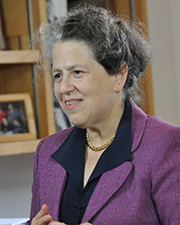Knowledge Institutions in Constitutional Democracies: Reflections on “the Press" - Annual Eric Barendt Law Lecture
Notes & Changes
This event will run as a Zoom webinar. To attend, register here. Please note that this event may be recorded, with the exception of any live audience questions
Constitutional democracies require an infrastructure of “knowledge institutions,” both inside and outside of the government. All governments require a knowledge base for competent decisions. Constitutional democracies, however, require a knowledge base that is widely shared among the public, whose decisions provide democratic legitimacy to government. “Knowledge institutions” -- which include universities, government statistical offices, and the press -- thus merit special recognition. Some question whether the press should be viewed in law as playing a special role; in the context of campaign expenditure regulation, the U.S. Supreme Court in 2010 rejected “‘the proposition that the institutional press has any constitutional privilege beyond that of other speakers.’” Should the press be distinguished from other speakers or businesses? Does the press have any definable shape, in an age of social media, citizen-journalism, and the consolidated ownership and control of entertainment and news businesses? How the law answers these questions may vary depending on the particular context: for example, whether the issue is a defense to defamation, or the assertion of investigative or testimonial privileges. But such questions cannot be analyzed without a clear recognition of the vital role of the press, as one of several interdependent knowledge institutions that sustain the epistemic base of constitutional democracy.
Speaker

Vicki C. Jackson, Laurence H. Tribe Professor of Constitutional Law (previously known as the Thurgood Marshall Professor of Constitutional Law), writes and teaches about U.S. constitutional law, federal courts, and comparative constitutional law. She is the author of Constitutional Engagement in a Transnational Era (2010), and coauthor, with Mark Tushnet, of Comparative Constitutional Law (3d ed. 2014), a course book in the field. She has written on federalism, gender equality, election law, free speech, knowledge institutions, sovereign immunity, justiciability, judicial independence, proportionality review, the co-evolution of international and constitutional law, methodological challenges in comparative constitutional law, and other topics.
Her edited collections include Comparative Constitutional Law (2020) (with Mila Versteeg, co-editor); Proportionality: New Frontiers, New Challenges (2017) (with Mark Tushnet, co-editor);Constitutionalism Across Borders in the Struggle Against Terrorism (2016) (with Federico Fabbrini, co-editor); Federal Courts Stories (2010) (with Judith Resnik, co-editor); and Defining the Field of Constitutional Law (2002) (with Mark Tushnet, co-editor). Other books include Federalism (2013) (with Susan Low Bloch) and a course book, Inside the Supreme Court: The Institution and Its Procedures (2d ed., 2008) (with Susan Low Bloch and Thomas G. Krattenmaker). Her current scholarly projects include work on normative conceptions of the role of elected representatives in a democracy; the role of knowledge institutions in constitutional democracies (and implications for U.S. First Amendment and administrative law); the role of effective government in sustaining constitutionalism; proportionality as principle and doctrine; and judging and gender.

